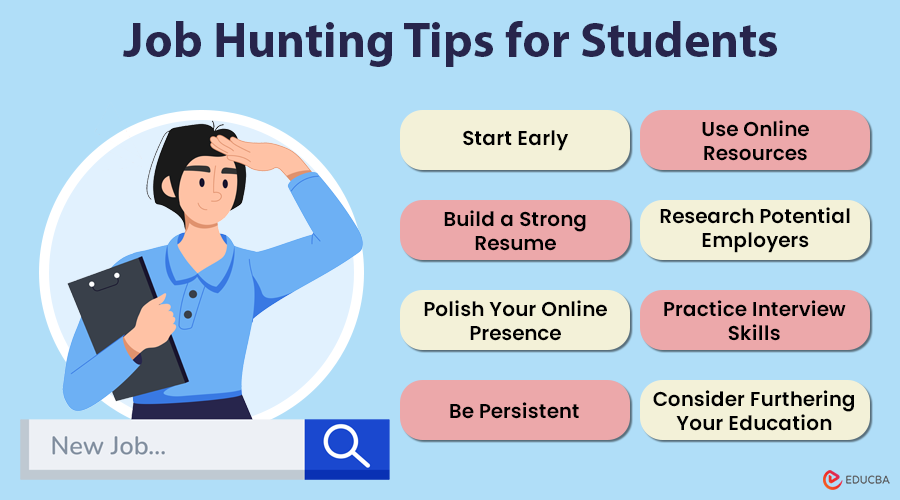
Essential Job Hunting Tips for Students
Shifting from being a student to entering the professional world can feel quite challenging. With assignments, exams, and social commitments, finding time to focus on your future career may seem daunting. However, starting your job search early can give you a competitive edge. Whether you are nearing graduation or just beginning to think about your future career, these eight essential job hunting tips for students help you embark on an effective job search journey.
#1. Start Early
Many students wait until after graduation to begin their job search, but starting early is one of the most effective strategies. You don’t have to wait until you complete your degree to start exploring job opportunities. By searching during your final year or even earlier, you give yourself plenty of time to research industries, network with professionals, and gain relevant experience. This proactive approach also allows you to avoid the stress of last-minute job hunting.
#2. Use Online Resources
One of the valuable tools for students starting their job search is the IndeedFlex app. This platform offers flexible job opportunities tailored to your schedule, making it easier to gain work experience. IndeedFlex connects you with a wide range of employers, ensuring a perfect staffing match based on your skills and availability. Whether you want temporary roles, part-time work, or even event-based jobs, this app helps you find roles that give you hands-on experience in various industries.
#3. Build a Strong Resume
Your resume is the first thing that gives recruiters your introduction, so it should be both strong and engaging. Take the time to create a well-organized, clear, and professional resume that highlights your academic achievements, internships, part-time jobs, volunteer work, and any relevant skills. Tailor your resume to each position you apply for by including keywords from the job description. If you are not sure where to begin, many universities offer career services with resume-writing workshops or one-on-one guidance.
#4. Research Potential Employers
Before you start sending out resumes, take the time to research the companies and industries you are interested in. Understanding a company’s mission, values, and culture can increase your chances of being a good fit. Additionally, researching an industry allows you to stay informed about trends and emerging opportunities. This knowledge will not only help you during the application process but will also give you confidence during interviews.
#5. Polish Your Online Presence
In today’s digital age, employers are likely to look you up online before considering you for a position. It means your social media profiles need to reflect a professional image. Clean up your personal accounts, removing any content that may seem unprofessional or inappropriate. Create or update your LinkedIn profile, ensuring that it includes a professional photo, a well-written summary, and a list of your experiences and skills. LinkedIn also helps connect with industry professionals, follow companies you are interested in, and showcase your work or accomplishments.
#6. Practice Interview Skills
Interviewing can be nerve-wracking, especially if you are new to it. However, like any skill, it gets easier with practice. Research common interview questions and prepare answers highlighting your strengths and experiences. Practice with friends, family, or career services counselors to receive feedback and improve your confidence.
Also, ask questions during as well as at the end of the interview. Employers appreciate candidates who are curious and engaged. You could ask about the company’s culture or team dynamics to show you are serious about finding the right fit.
#7. Be Persistent
It’s easy to feel discouraged when your job search doesn’t yield immediate results. You may face rejections or even hear nothing at all from employers. The key to success is persistence. Continue applying for jobs, expanding your network, and improving your skills. Each application and interview is a learning experience that gets you closer to your goal. Remember, it can take time to find the right job, especially as a student or recent graduate. Don’t give up, and stay focused on your long-term career goals.
#8. Consider Furthering Your Education
If you struggle to find a job in your desired field, consider whether additional education or certifications could make you more competitive. Some industries value specialized knowledge, and acquiring certifications or pursuing further studies might open doors to more job opportunities. Whether it’s a short course or a full-time graduate program, investing in yourself can significantly enhance your job prospects.
Final Thoughts
Starting your job search as a student can be both exciting and challenging. By following these ten essential tips, you can find the right job that aligns with your skills and goals. Remember, the journey to employment is a learning experience in itself, so stay persistent, remain open to opportunities, and build the foundation for a rewarding career.
Recommended Articles
We hope you use these job hunting tips for students to land their first job. Here are other useful resources you can check.
